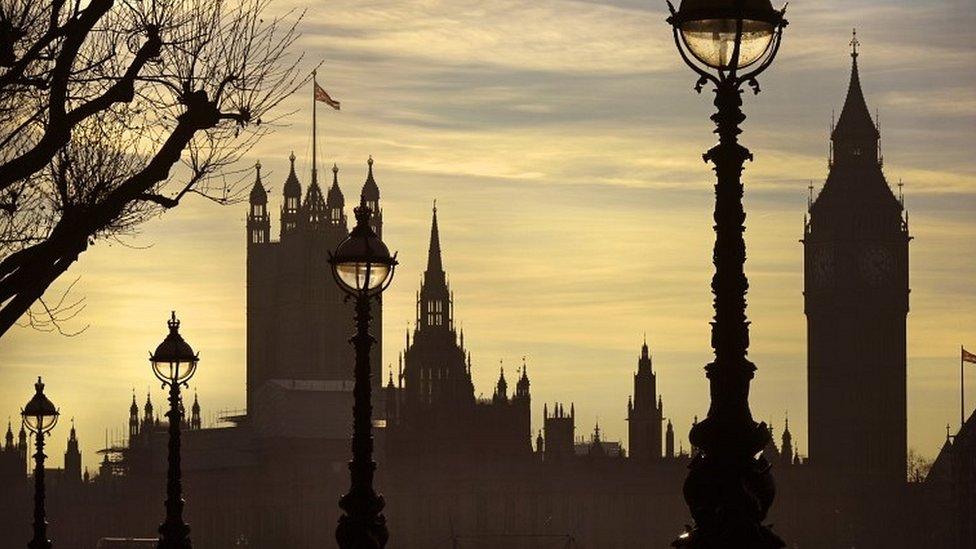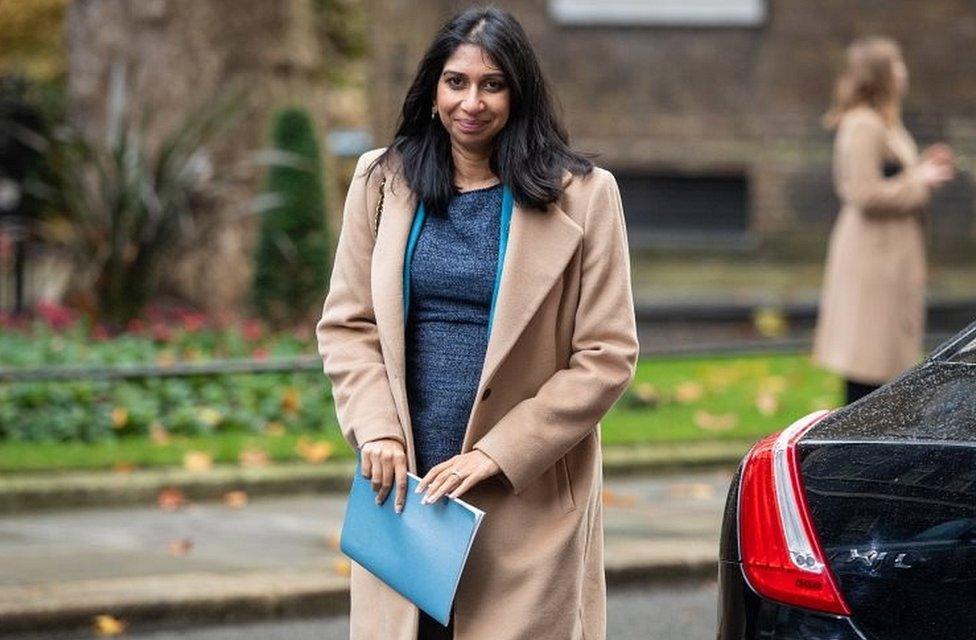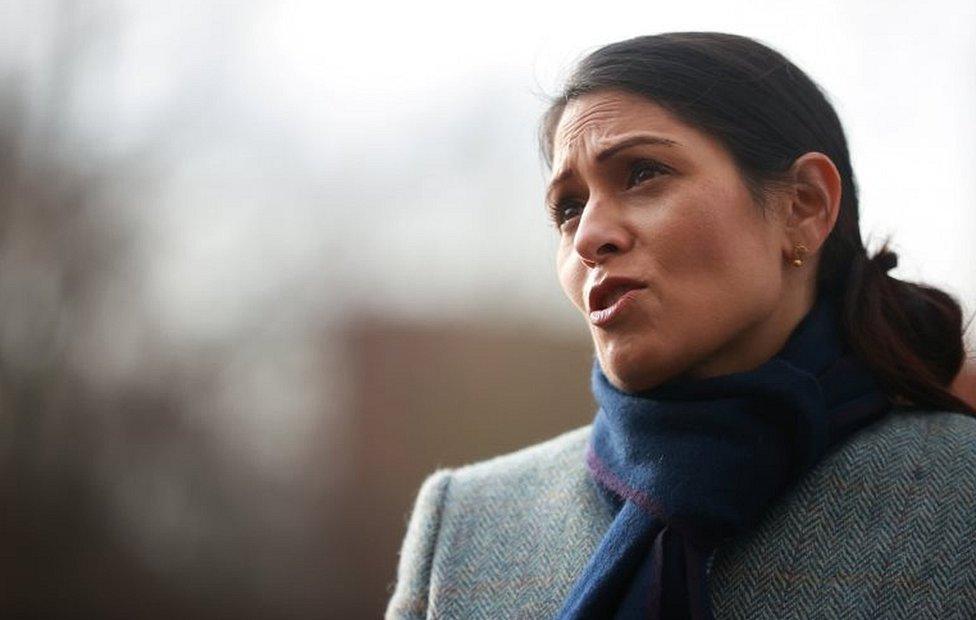The week ahead in Parliament
- Published

Parliament resumes with two major announcements in the pipeline.
The prime minister is due to set out his plans to lift the lockdown, as the rollout of the vaccines continues.
The following week Chancellor Rishi Sunak will deliver his Budget, providing some inkling of how the government plans to pay for the pandemic.
The first probably eclipses the second in terms of public impact, but between them, the two announcements will set the domestic agenda right up to the next election,
The pre-pressuring around the lockdown announcement began before the half-term break, with some blunt warnings from the Conservative backbench Covid Recovery Group setting out its expectations, in a letter signed by 63 MPs.
Its shopping list includes the return of schools on 8 March, followed by the re-opening of shops, pubs and restaurants for Easter, and the lifting of legislative restrictions by the end of April.
That is the yardstick against which a significant section of his troops will judge the PM's plans. If they're unhappy, the need to renew the Coronavirus Act, (the next six-monthly renewal is due in March) would provide an opportunity to register their discontent.
This raises the possibility that the government might attempt to placate internal critics by modifying or replacing the legislation, which covers all kinds of issues, from the management of dead bodies to restrictions on the movement of potentially infected people.
'Pitch-rolling'
The second theme of the week is the build-up to the Budget, during which MPs make last-minute pitches for particular causes, issue warnings against rumoured proposals they don't like the look of, and scrutinise every ministerial word for hints of the policies to be unveiled - and in particular for any "pitch-rolling" ahead of tax increases.
And Europe, always Europe. The appointment of Brexit negotiator Lord Frost as a Cabinet Office minister, inheriting Michael Gove's Brexit responsibilities, has sent eyebrows skywards across Westminster.
In the past, cabinet ministers in the Lords have sometimes had special question times allocated to them (the Lords does not have Commons-style departmental question times) and while Lord Frost is not a full secretary of state, his ministerial brief is so critical that there may be moves for some similar arrangement.
Here's my rundown of the week ahead.
Monday 22 February
The Commons opens 14:30 with Housing, Communities and Local Government (including topical questions), with the expectation that the prime minister will then deliver that lockdown statement and take questions on it for a couple of hours.
That will then feed into the day's main business, one of the regular series of General debates on Covid-19, which will allow further reaction to whatever had been announced. These debates are normally led by the Health Secretary, Matt Hancock.
The day's committee action includes Public Accounts taking evidence on supporting the vulnerable during lockdown (14:30) with Sir Chris Wormald, permanent secretary at the Department of Health and Social Care, Jeremy Pocklington, permanent secretary at the Ministry of Housing, Communities and Local Government and a supporting cast of senior officials.

Suella Braverman's maternity leave has prompted a rule change
And, deprived of its normal Westminster Hall debates because of the pandemic, the Petitions Committee takes evidence on the movement of goods between Great Britain and Northern Ireland, in response to an e-petition.
In the Lords (13:00) ministers field questions on the proportion of teaching posts in London, and elsewhere in England, which are currently provided by supply teacher agencies, ensuring the government provides timely answers to written questions, plans to increase the permitted spending limits for political parties at general elections, and the level of food-related crime.
Peers will then give a second reading to the Ministerial and other Maternity Allowances Bill - the special measure to allow the Attorney-General, Suella Braverman, to take maternity leave. They should have the bill through all its Lords stages by the end of the week.
The day's real meat, at least for peers themselves, is the debate on the latest report from the Procedure and Privileges Committee, which will probably be quite lively. A number of peers are already unhappy at the suspension of the hereditary by-elections, which top up the contingent of 92 hereditaries who still sit in the House, when one of them leaves or passes away.
The much-mocked by-election process, in which hereditary peers of a particular party vote on a successor, has sometimes seen the candidates outnumber the voters. It has been suspended since the start of the pandemic, and the vacancies are beginning to pile up. But the Committee recommends that the suspension should continue, arguing that an online election would be unsatisfactory, because virtual hustings would disadvantage lesser-known candidates.
This is something of a proxy for the continuing row over the presence of any hereditaries in the Lords, (the legacy of the "Weatherill Amendment" compromise over Lords reform, in the late 1990s) which has produced some unusually sharp debates in the past, and true to form, the Conservative ex-minister Lord Trefgarne has put down a regret motion. Bring popcorn.
Tuesday 23 February
The Commons meets (11:30) for an hour of Health and Social Care questions. It's an Opposition Day, so the government will normally not make a ministerial statement, unless there's something very urgent to deal with.
Then comes a Ten Minute Rule Bill from Conservative Rob Butler. His Youth Courts and Sentencing Bill aims to prevent someone who commits an offence under the age of 18 being tried as an adult, because the matter doesn't come to court until they are over 18.
At the moment the system treats defendants according to their age at the time of their first court appearance - which could mean they are not dealt with by specially trained magistrates or judges, or subject to the youth courts' central aim of preventing reoffending. Mr Butler, an ex-JP, says the court delays resulting from the pandemic have made this anomaly even more of a problem.
The main debates will be on Labour Opposition Day motions, yet to be announced.

Ministers face questions on children's access to laptops
The day ends with an adjournment debate on the death of WPC Yvonne Fletcher, who was shot while policing a demonstration outside the Libyan embassy in 1984, led by Conservative Bob Stewart.
On the Committee Corridor, Business, Energy and Industrial Strategy has a session on firms' Brexit preparedness (10:45).
Defence takes evidence from academic experts on China's military ambitions (14:30) and Digital, Culture, Media and Sport (15:15) continues its investigation into the economics of music streaming with witnesses from Amazon, Spotify and Apple.
There's also a rare meeting of Parliament's Ecclesiastical Committee (10:00), the body which processes changes in the law dealing with the established Church. The cast includes the bishops of Bristol and Durham and dignitaries from the General Synod.
In the Lords (12:00) ministers field questions on providing laptops and tablets to school pupils, and on democracy in Belarus
The main event is the consideration of Commons amendments to the Trade Bill, following the (indirect) rejection of the latest incarnation of the anti-genocide "Alton amendment," which had attempted to provide a mechanism for determining whether a state is complicit in genocide, to allow Parliament to consider whether the UK should have a trading relationship with it.
MPs did not get the chance to vote directly on the Alton amendment, perhaps reinforcing the determination of Lord Alton and his supporters to press it again.
Wednesday 24 February
The Commons opens (11:30) with a new fixture, which will remain on the parliamentary calendar until November - questions to Alok Sharma in his new role as President of COP26, the international climate change conference, due to be held in Glasgow in November. So all-embracing is the topic that there could be questions on almost anything, and Mr Sharma may end up referring many of them to other departments.
Prime Minister's Question Time at 12:00 is followed by a Ten Minute Rule Bill from Labour's Holly Lynch on regulating the renting of high-performance vehicles.
The main legislative action is consideration of Lords Amendments to the Fire Safety Bill, where the fallout of the Grenfell Tower disaster continues. The government is facing pressure to ensure that leaseholders of flats in unsafe tower blocks do not face huge bills for safety work, and excessive insurance premiums.
Watch out for the Conservative duo Steve McPartland and Royston Smith, who have been mustering backbench Tories in support an amendment to the bill.
Mr McPartland dismissed the solution offered by the Housing Secretary, Robert Jenrick, as "all smoke and mirrors," and says he now has 40 supporters on the Conservative benches - enough to defeat the government in a vote. One of the government defeats on this bill in the Lords inserted a clause preventing building owners from passing on the costs of safety work to leaseholders - so there could be resistance to overturning that.
But as the experience of the Trade Bill demonstrates, the government's control over what is voted on in this kind of Commons proceeding could make it difficult to bring rebel votes to bear.
Next. MPs consider Lords amendments to the Telecommunications Infrastructure (Leasehold Property) Bill, where peers inserted a requirement for regular reports on progress towards universal access to 1 gigabyte-capable broadband.

Priti Patel looks set for a tough session with MPs
On the Committee Corridor, Home Secretary Priti Patel is before the Home Affairs Committee (10:30) for what promises to be a robust encounter. Committee chair Yvette Cooper has been critical of the operation of pandemic border controls, among other issues.
Northern Ireland Affairs (09:30) takes evidence on Brexit and the Northern Ireland Protocol and Treasury (14:30) hears evidence on the February 2021 Monetary Policy Report, with Bank of England Governor Andrew Bailey.
In the Lords (12:00) question time ranges across progress towards Covid-19 vaccination programme delivery targets and objectives, the relationship between the emergence of pandemics and environmental degradation, and barriers to using the Channel Tunnel for transporting rail freight.
Then peers turn to the detail of the (spectacularly uncontroversial) Non-Domestic Rating (Public Lavatories) Bill.
Thursday 25 February
The Commons opens (09:30) with International Trade questions, followed by the weekly Business Questions to the leader of the House.
Then come two debates chosen by the Backbench Business Committee - first on the proposal for a national education route map for schools and colleges in response to the pandemic, and then the annual St David's Day debate on Welsh affairs.
In the Lords (12:00) ministers field questions on ensuring all eligible electors prevented from voting by medical advice and restrictions to address Covid-19 can participate in elections on 6 May, and supporting coastal communities to improve the capacity of the fishing sector.
Finally, peers polish off the detail and administer a final rubber stamp to the Ministerial and other Maternity Allowances Bill.
